The Creator: A Fresh (If Flawed) Vision Of Human-Machine Conflict
In Gareth Edwards’ sci-fi saga The Creator, humans, robots and humanoid robots (called “simulants”) are caught in a large-scale existential war. Prahlad Srihari reviews.
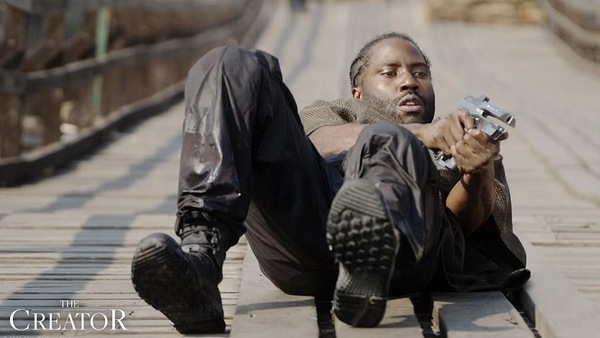
Last Updated: 12.51 PM, Sep 30, 2023
HAL 9000, Skynet, Agent Smith, M3GAN, The Entity: artificial intelligence has taken on different names and different forms on screen. Each raises a queasy concern over how our creation could come to regard us once they surpass us. How would the in-betweenness of a sentient machine destabilise our perception of self? This insecurity regresses into violence, as it so often does, in the near-future of Gareth Edwards’ sci-fi saga The Creator. Humans, robots and humanoid robots (called “simulants”) are caught in a large-scale existential war. While the robot and “simulant” populace ask to be treated with the same rights as humans, the ever-warmongering US government is itching to quash any AI rebellion — by any means (un)necessary.
Not since Battlestar Galactica has a fresh vision of a man-machine conflict been realised with such manic conviction. Not on an $80 million budget at least. Edwards’ stylishly rendered, densely textured futurescape looks a lot more expensive than it really is. A welcome penchant for shooting on-location and practical effects allows him to find an unexpected beauty in a world that is at once futuristic and familiar.
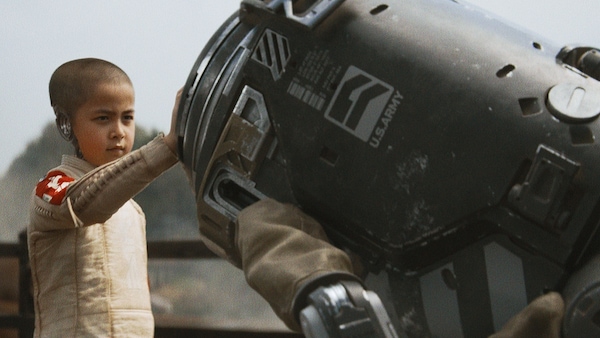
If Godzilla and Rogue One: A Star Wars Story proved Edwards could play within big franchise sandboxes, the 2010 debut Monsters (shot on a budget of less than $500,000 with a couple of no-name actors) hinted at the kind of talent who could build his own. With The Creator, he indeed does. But not without borrowing source code from sci-fi favourites: John David Washington’s protagonist, like Rick Deckard in Blade Runner, is tasked with hunting down humanoid robots before he is forced to confront his preconceptions; a floating WMD called NOMAD, like the Death Star, has a laser cannon that can reduce everything to rubble; the battle-hardened older man and quasi-daughter at the centre of the movie share a dynamic that will recall Logan/The Last of Us; the reckoning of grief and trauma on the front lines will bring to mind every other genre movie. Not to say The Creator doesn’t have a single original piece of circuitry in its mainframe. But once the credits roll, you do leave the theatre admiring the ambition while bemoaning the lack of allegorical clarity.
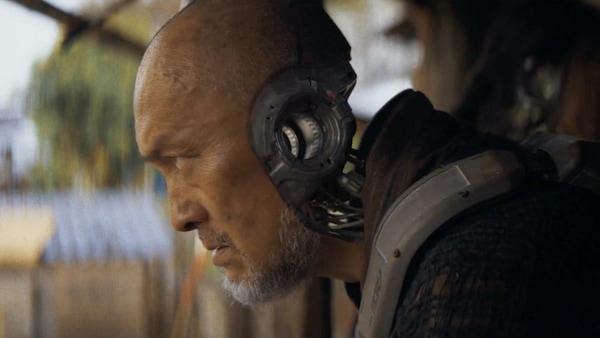
For as the movie goes on, the gap between effort and execution comes into sharper focus. It may not be the most cerebral sci-fi movie of the year, but it is the most conflicted one. Edwards builds on ripped-from-the-headlines conversations around the co-existence of AI and humanity: how can both evolve in tandem when so many of our very livelihoods, if not lives (at least not yet), are at stake? At the same time, he casts “simulants” as the Other. If we like to talk about AI in terms of intelligence as the common denominator, he questions why we tend to treat it as something disconnected from humanity, rather than as transhuman.
So, the movie seems to suggest if AI is often positioned as a malign entity, it is mankind violently rejecting its own self in the guise of its Othered creation. By creating a power structure that places “simulants” in a forced-upon inferior position and positioning humans as the provokers, Edwards indicts the creators for failing to understand their creation and meet on the same level. Therein lies the conflict. Is the movie asking us to be wary of AI, urging for empathy, and guilt-tripping us? The whole venture is too myopic and scrambled by its own wounded logic to know for certain.
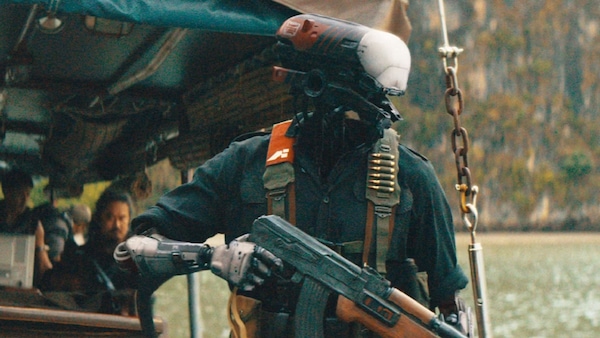
What is known for certain is sci-fi movies work best, not when their Big Ideas are treated like window dressing, but when interrogated with the gravity and acuity they merit. Not every sci-fi movie needs to be a cautionary lecture. There is artistic merit to a movie whose wholehearted ambition is to simply entertain. The Creator is neither this nor that. But it does begin promisingly enough. A black-and-white sequence of news reports and commercials gets us up to speed on how mankind and “simulants” came to live in harmony until they didn’t. The destruction of Los Angeles leads to a wholesale ban on AI in the West. In the East, however, “simulants” live as equals in the umbrella nation of New Asia. Hollywood continues to lump us all into one pan-ethnic collective for the sake of convenience. In doing so, it flattens entire cultures and buries distinct subgroups.
In the East-West contrast, we see two worlds representing parallel destinies for human-AI co-evolution. The American hegemony is of course not happy about New Asia doing things their own way. Because it always has to be either their way or the highway. As they did in the wars waged in Korea, Vietnam, Nicaragua and so many more countries under the pretext of installing democracies, the US decides here as well to take on the role of the world’s moral arbiter. To that end, a stealthy deathstar enters New Asian airspace to bomb laboratories and tanks rip through “simulant” strongholds — the invasion and carnage juxtaposed against the pleasant melodies of Radiohead’s “Everything in Its Right Place” and Debussy’s “Clair de Lune.”
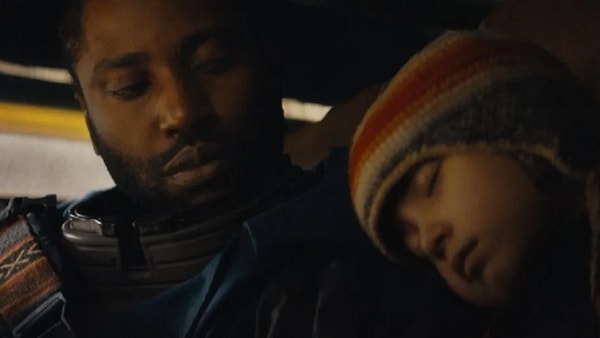
Amidst this global conflict, American undercover agent Joshua (Washington) is recruited by Colonel Jean Howell (Allison Janney) to find and kill the “Creator” aka Nirmata, a scientist loyal to the “simulant” cause who has developed a weapon that could end the war. But not in the West’s favour. If defeating the East was not motive enough for Joshua, it is the fact that his presumed-to-be-dead wife Maya (Gemma Chan) could in fact be alive and hiding in New Asia. When he gets there, he finds out the war-ending weapon is “simulant” child named Alphie (Madeleine Yuna Voyles).
The next part shouldn’t be hard to guess. As Joshua reluctantly shepherds Alphie to safety, the two bond. Playing surrogate father to Alphie compels Joshua to reconsider the humanity of “simulants” and grapple with what is real vs what is programming. The quietness of Voyles’ performance as Alphie asserts an intelligence that’s anything but artificial. Washington, on the other hand, lays on the reluctant hero act a bit too thick — as opposed to an atypically sparse score from Hans Zimmer. Lacklustre leading man aside, what really dulls the power of The Creator is its ambitions don’t match the actualities of its execution. For the more ideas Edwards loads into the movie, the emptier it somehow feels.
